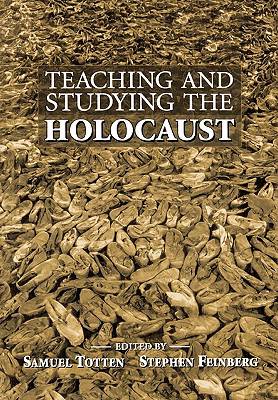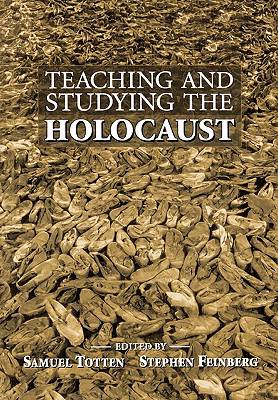
- Retrait gratuit dans votre magasin Club
- 7.000.000 titres dans notre catalogue
- Payer en toute sécurité
- Toujours un magasin près de chez vous
- Retrait gratuit dans votre magasin Club
- 7.000.000 titres dans notre catalogue
- Payer en toute sécurité
- Toujours un magasin près de chez vous
84,95 €
+ 169 points
Description
(Originally Published in 2000 by Allyn & Bacon) Teaching and Studying the Holocaust is comprised of thirteen chapters by some of the most noted Holocaust educators in the United States. In addition to chapters on establishing clear rationales for teaching this history and Holocaust historiography, the book includes individual chapters on incorporating primary documents, first person accounts, film, literature, art, drama, music, and technology into a study of the Holocaust. It concludes with an extensive and valuable annotated bibliography especially designed for educators. Chapter Ten instructs how to make effective use of technology in teaching and learning about the Holocaust. The final section of the book includes a bibliography especially developed for teachers that lists invaluable resources. From the Back Cover: Holocaust scholars from around the world offer critical acclaim for Totten and Feinberg's Teaching and Studying the Holocaust: Michael Berenbaum; Ida E. King Distinguished Visitor Professor of Holocaust Studies, Richard Stockton College and Former Director of Research at the United States Holocaust Memorial Museum: "There are many scholars who are wont to criticize the teaching of the Holocaust. Many journalists critique what they regard as kitsch or trendiness. All critics of contemporary Holocaust education would do well to read this book. One cannot fail to be impressed by the quality of its learning and the seriousness of its purpose. It is a wonderful place for teachers to turn as they contemplate teaching the Holocaust, an open invitation to learn more and teach more effectively." Barry van Driel; Coordinator International Teacher Education, Anne Frank House, Amsterdam: "Teaching and Studying the Holocaust is an invaluable resource for any teacher wanting to address the complex and sometimes overwhelming history of the Holocaust in the classroom. The book offers a multitude of sensitive and responsible ways of dealing with the issue of the Holocaust. It succeeds in showing teachers very clearly how the study of the Holocaust is not just a topic for history teachers, but for teachers across the curriculum." Dr. Nili Keren; Kibbutzim College of Education, Tel Aviv, Israel "Teaching about the Shoah is one of the most complicated tasks for educators. Indeed, teaching and studying this history raises unprecedented questions concerning modern civilization, and presents teachers and students with tremendous challenges. Samuel Totten and Stephen Feinberg have created a volume that provides educators with essential information and new insights regarding the teaching of this history, and, in doing so, they assist educators to face the aforementioned challenges head-on. Teaching and Studying the Holocaust does not make the task easier, but it does make it possible." Samuel Totten is currently professor of Curriculum and Instruction at the University of Arkansas, Fayetteville. Prior to entering academia, he was an English and social studies teacher in Australia, Israel, California, and at the U.S. House of Representatives Page School in Washington, D.C. Totten is also editor of Teaching Holocaust Literature published by Allyn & Bacon. Stephen Feinberg is currently the Special Assistant for Education Programs in the National Institute for Holocaust Education at the United States Holocaust Memorial Museum. With Samuel Totten, he was co-editor of a special issue (Teaching the Holocaust) of Social Education, the official journal of the National Council for the Social Studies. For eighteen years, he was a history and social studies teacher in the public schools of Wayland, MA.
Spécifications
Parties prenantes
- Auteur(s) :
- Editeur:
Contenu
- Nombre de pages :
- 370
- Langue:
- Anglais
Caractéristiques
- EAN:
- 9781607523000
- Date de parution :
- 28-09-09
- Format:
- Livre broché
- Format numérique:
- Trade paperback (VS)
- Dimensions :
- 170 mm x 244 mm
- Poids :
- 589 g







